Table of Contents
Around the globe, people are taking time off in December. In December, there are several holidays, festivals, observances, national days, food days, and festivities to look forward to.
December Global Holidays are divided into groups based on when they occur every month. Some dates are subject to vary from year to year.
For further information December Global holidays please go to the specific observance’s article.
December Global Holidays 05-06: St. Nicholas Eve | Sinterklaas Day
Saint Nicholas Day occurs on December 6, but the festivities begin on St. Nicholas Eve, which is the evening before the holiday. These days, which are observed across Europe, commemorate St. Nicholas, who is the patron saint of children, gift-giving, and the season of Advent and Christmas.

With white hair and a long, thick beard, Sinterklaas is an ancient and solemn guy. Over a customary white bishop’s alb (a garment that comes down to the ankles) and sometimes a crimson stola, he dons a long red cape or chasuble (like a toga). The king is decked out in a crimson mitre (bishop-like headdress) with a ruby ring and wields a gold-coloured crosier–a ceremonial shepherd’s stick with a gorgeous curled top–in his right hand. A white horse is what he usually rides. Known as Amerigo in the Netherlands, and Slecht Weer Vandaag in Belgium, the horse’s name translates as “Bad Weather Today” in both languages. Sinterklaas travels about with a large book that indicates whether a youngster has been good or bad over the previous year, according to legend. The iconic Christmas figure, Santa Claus, is derived from one of his works.
On the eve of St. Nicholas, children in Belgium place their shoes by the fireplace in the hopes that Sinterklaas would drop gifts and trinkets in them as he rides through. Slecht Weer Vandaag’s shoes are packed with carrots and sugar cubes, while Sinterklaas’ shoes are put next to a cup of coffee, which is left out for him. These are replaced with presents when Sinterklaas arrives. This is the most important day of the year for children. Gifts are given to children when they are older or more mature.
When children in the Netherlands prepare for St. Nicholas Day (also known as Sinterklaasavond or Pakjesavond), they place their shoes beside their beds on the night before the holiday in the hope that Sinterklaas, a merry old elf, would fill them with gifts and candies. Hot chocolate, mandarin oranges, pepernoten, speculaas, Dutch letters (letter-shaped pastries filled with almond paste or chocolate), chocolate coins, and marzipan figurines are some of the traditional Sinterklaas goodies to indulge in. Gingerbread cookies and a chocolate figure of Sinterklaas wrapped in colourful aluminium foil are among the most recent additions to the menu.
Western Christian nations celebrate Saint Nicholas’ Day on December 6th, the Netherlands celebrates it on December 5, and Eastern Christian countries celebrate it on December 19th.
December Global Holidays 08: Bodhi Day
The Japanese holiday of Bodhi Day is observed on December 8th. The Laba Festival, which is celebrated on the eighth day of the twelfth lunar month of the Chinese calendar, is the equivalent of the Han Festival in the West (December or January, but usually January).

This day commemorates Siddhartha Gautama’s attainment of enlightenment. Following years of intense ascetic practices, Siddhartha had just decided to sit beneath a peepal tree and concentrate until discovering the source of pain and how to free oneself from it, according to tradition.
The Buddha discusses his Enlightenment in three phases in the Pali Canon, The Longer Discourse to Saccaka, which may be found in the Pali Canon.
- On his first watch, the Buddha realized all of his previous incarnations in the cycle of reincarnation, recognizing that he had been born and reincarnated countless times in the previous lifetimes of the Buddha.
- During the second watch, the Buddha learned about the Law of Karma and the significance of following the Eightfold Path in one’s life.
- During the third watch, the Buddha realized the Four Noble Truths, which resulted in his ultimate attainment of Nirvana.
It was in the early morning hours of the third watch that Siddhartha discovered the answers he had been seeking, and it was at that point that he attained Enlightenment and attained Nirvana for the first time. The Buddha, often known as the “Awakened One,” was born of Siddhartha.
People commemorate this day by meditating, studying the Dharma, reciting Buddhist scriptures, and/or committing acts of kindness towards others, among other activities. A traditional dinner of tea and cake is served by some Buddhists to mark the holiday.
On December 13th, We celebrate Santa Lucia Day | Yule as December Global Holidays
On December 13, Santa Lucia Day, also known as Little Yule, is observed. When Christians were being persecuted in the early fourth century, a young girl named Santa Lucia (St. Lucy) was killed. She was a young girl from Syracuse, Sicily. Except for the fact that she was courageous, little is known about her. Legends, on the other hand, grew over time. It is believed that she delivered food to Christians who had taken refuge in the catacombs.
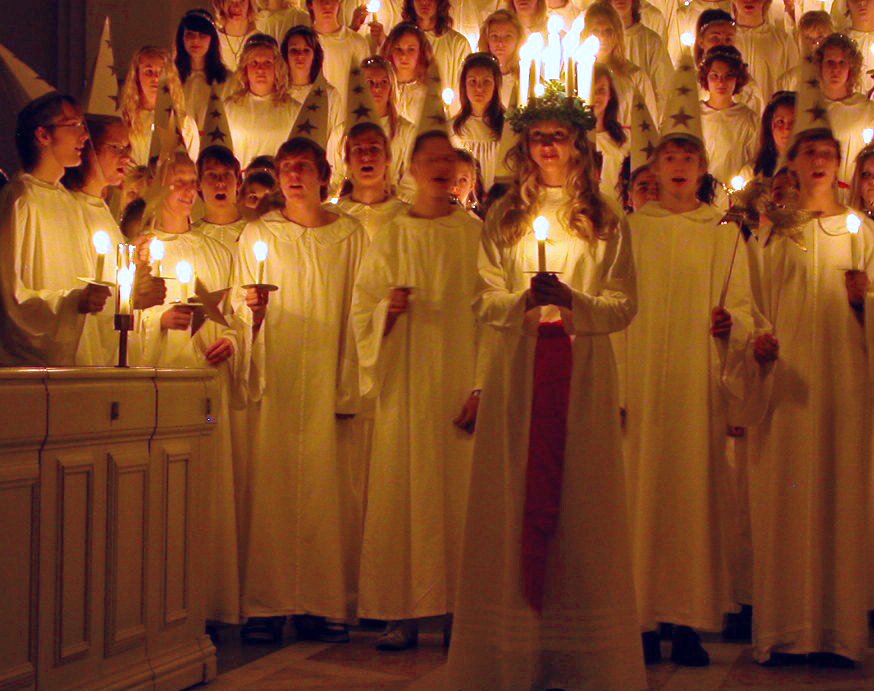
Another version of the story claims that she had dedicated her life to the service of Jesus. Her mother, on the other hand, arranges for her to be married to a pagan. In response to Lucia’s rejection of her prospective husband, he reported her to the authorities. They attempted to drag her away to a brothel to work as a prostitute, but she resisted. Due to her being as stiff and heavy as a mountain, however, the guards were powerless to move the woman. Her punishment was to be tortured and then set on fire before being executed.
Happy Santa Lucia Day! 🕯
To celebrate, I recreated this childhood look! I’ve grown a bit. 😂 pic.twitter.com/9agaTZQSgt— kelsey michele✨ (@toughtinkart) December 13, 2020
Before the calendar reform, St. Lucia’s Feast Day was celebrated on the same day as the Winter Solstice, which transformed her feast day into a festival of light. Lucia is a Latin word that means light, which is interesting. Scandinavian countries, where winters are long and dark, are the most enthusiastic about celebrating St. Lucia’s Day. Throughout Sweden, she is commemorated by young girls who are dressed in white with vivid red ribbons and a wreath of candles around their necks (today the candles are battery operated). The parents get a platter of saffron cakes and a cup of coffee or tea from the oldest daughter. Boys, too, wear in white, with white pointed caps adorned with stars on their heads. They are referred to as Star Boys. Several pageants are held, and one young lady is chosen as the “Lucia Bride,” who leads the pageant with the other youngsters following after.
In northern Italy, St. Lucia Day is observed like that of St. Nicholas. St. Lucia arrives in town on the back of a donkey, accompanied by her bodyguard, Castaldo. Coffee for Lucia, flour for the donkey, and bread for Castaldo are all left by the children. St. Lucia leaves presents in exchange for her services. Throughout the city of Siracusa, there are festivals, fireworks, sweets, and a pledge not to consume pasta or bread for the duration of the week-long celebration.
Luciadagen is celebrated in Finland a week before the Winter Solstice on December 21st. As a “beacon of sunshine” at the most gloomy period of the year, St. Lucy is commemorated.
This was once referred to as Lussinatten in Norway. On the shortest night of the year, there was no work to be completed. Lussi, a feared enchantress, was known for punishing those who dared to go to work. On this particular night, according to folklore, farm animals spoke with one another.
December Global Holidays: Chanukah | Hanukkah
Even though Chanukah is a small Jewish festival, it is the one that is most well-known among non-Jews. This is due in part to the fact that it is so close to Christmas. Chanukah (also known as Hanukkah) is a Jewish festival that starts on the 25th day of the Hebrew month Kislev, which is either November or December. Chanukah, which translates as “dedication,” commemorates the rededication of the Temple in Jerusalem. It lasts for eight days and, like other Jewish holidays, it starts at sunset on the first day of the week.
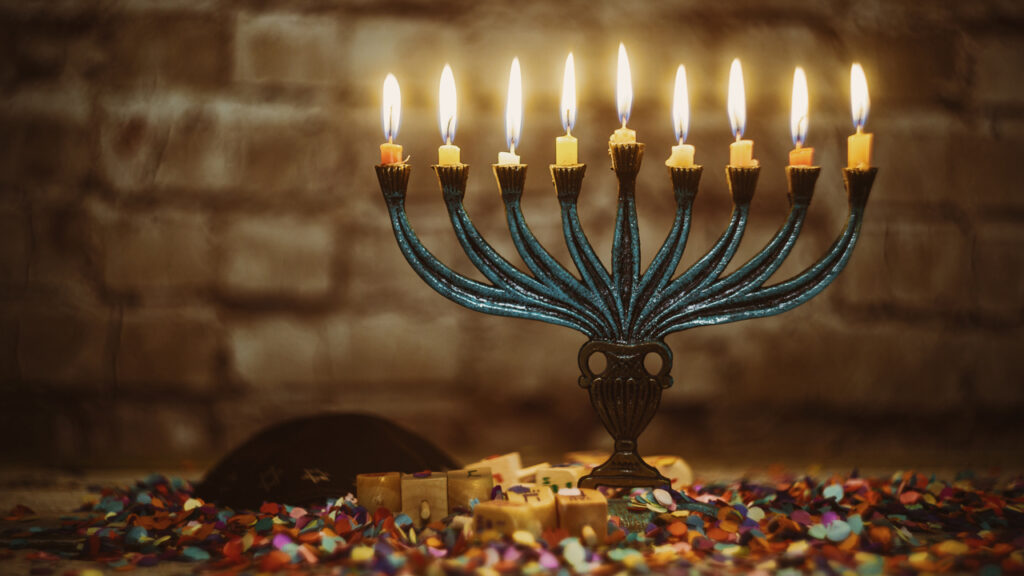
In the year 168 BCE, a Greek monarch by the name of Antiochus reigned over Jerusalem. He imposed his religion and deities on the populace by force. He seized control of the great temple of Jerusalem, set fire to the sacred scriptures, and sentenced academics to death in the process. When a troop of soldiers marched into the little town of Modin, they were welcomed by a group of men who were dissatisfied and rebellious. These guys refused to comply with the troops’ orders, and a struggle erupted, with the soldiers being killed as a consequence. The men escaped to the mountains, where they stayed for many years, fighting and robbing the king’s army in their pursuit of victory. The Maccabees were a group of warriors who fought against the Romans.
Upon returning home, the Maccabees’ commanders swore to wash the temple and rededicate it to Jehovah, as a sign of their commitment to the cause. They needed to restore the everlasting light to do this. The consecrated oil, however, was simply a little jar, which they were unable to locate. Renewing the oil would require eight days of effort. There was no way that little quantity of oil would last even for a day, much alone for many weeks. However, a miracle occurred. It did last for eight days, which was a record.
Chanukah commemorates this miracle, as well as the triumph of virtue over evil. Every day, a single candle is lighted. The candles are customarily held in a menorah, which is a sort of candelabrum. Other customs include giving (or getting) a gift on each of the eight nights of Chanukah, receiving Chanukah gelt (chocolate coins wrapped in foil), singing songs, spinning dreidels, and eating on delicious cuisine that is generally prepared in and with oil. Rugelach (cookies filled with almonds, poppy seed paste, chocolate, or jam), loukoumades (fried dough coated in honey), kugel (a sweet noodle dish), and sufganiyah are some of the most popular dishes. Latkes (potato pancakes) are another popular cuisine (jelly doughnuts).
December Global Holidays 21: Yule
Since the 4th century, people have been celebrating Yule. This twelve-day midwinter event begins on the Winter Solstice and concludes on the Spring Equinox (usually December 21). Yule has been related to the Old Norse term jól, which means “new year.” The phrase “magic” or “feast of entreaty” may have been used to describe anything magical or mystical. It’s also possible that it’s the origin of the English word “happy.” Around 1475, the phrase “Yuletide” first appeared in print.
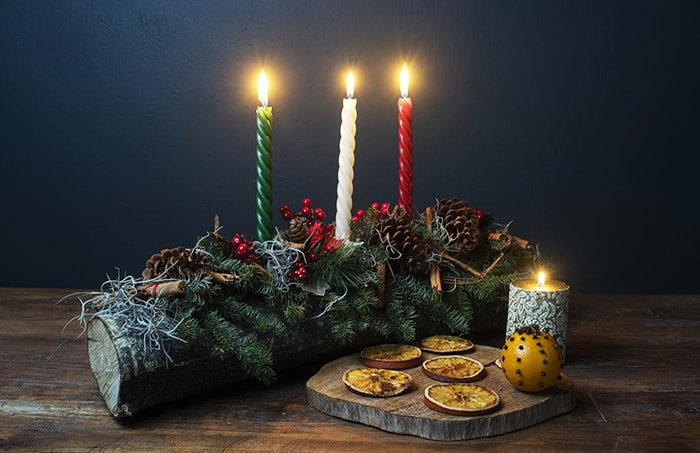
Traditions and customs associated with the holiday season:
- Bonfires to provide illumination for the night
- The crops and trees were floated away (cider poured on and around plants)
- The sun was represented with pomanders, which were fashioned by inserting cloves into apples and oranges.
- The mansion was ornamented with evergreen boughs, holly, and ivy, which represented life; holly beside the entrance welcomed good fortune into the residence.
- Druids regard hanging mistletoe as a holy and mysterious plant, and they use it to decorate their homes.
- The Yule log was stoked and blazed all night long.
- Many Yule traditions are now included in the Christmas festivities.
December Global Holidays 25: Christmas
All across the globe, people celebrate Christmas in a wide variety of ways. Christes Maesse, a religious celebration commemorating the birth of Jesus that took place in the Bethlehem plains, is credited with establishing the holiday as its foundation. It wasn’t until 350 CE that a specific day was set to commemorate this momentous milestone. Although some say it has been honoured since 98 CE, others claim it has only been celebrated recently. To commemorate the anniversary, Julius I, Bishop of Rome, selected the 25th of December.
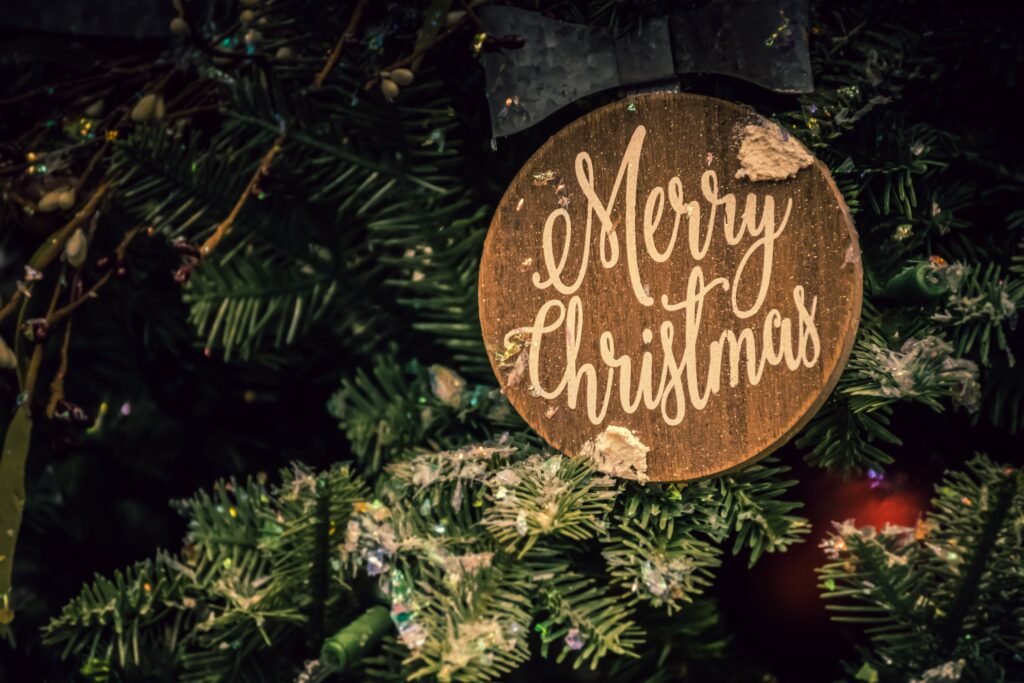
Several pagan festivities were conducted during the winter, causing tensions among the Christian community. This decadent Roman holiday, known as Saturnalia, lasted between two and three weeks. They celebrated their agricultural deity with a slew of eating, drinking, and general merriment during this festival. There have been (and continue to be) celebrations of the Winter Solstice in a variety of cultural traditions. The Winter Solstice is the shortest day of the year, and the following days begin to become longer, hence the rebirth of the sun was commemorated on this day in ancient times. The Persians celebrated Mithra’s birthday by feasting and paying respect to him, whereas the Teutonic tribes celebrated Woden’s birthday by paying him tribute.
Even though Telesphorus, Bishop of Rome, designated this day to be a serious event in 137, the influence of the many pagan festivals was bound to have an impact on the celebration. Many pagan rites and practices were absorbed into Christmas after repeated unsuccessful efforts to remove them from the Christian festival. This was accomplished by “Christianizing” them. The result of this is that Christmas represents the union of ancient and contemporary faiths.
December Global Holidays 26-January 01: Kwanzaa
Kwanzaa is an African-American festival that commemorates and celebrates one’s black roots. It was formed in 1966 by Dr. Maulana Karenga (born Ronald McKinley Everett) to educate his people about African-American struggles and their rich cultural legacy. Dr. Maulana Karenga was the first African-American to hold this position.
On December 26th, the holiday officially begins and will remain for seven days. It ties together the African harvest rites and the social history of African-Americans in one cohesive whole. The term Kwanzaa is taken from the East African Swahili word “Mantunde ya kwanza,” which translates as “the first fruits,” and refers to the harvest of the first fruits. It was decided to include the second “a” to make the name seven letters long, which correlates to the seven Kwanzaa symbols, the seven principles, and the seven days of the holiday.
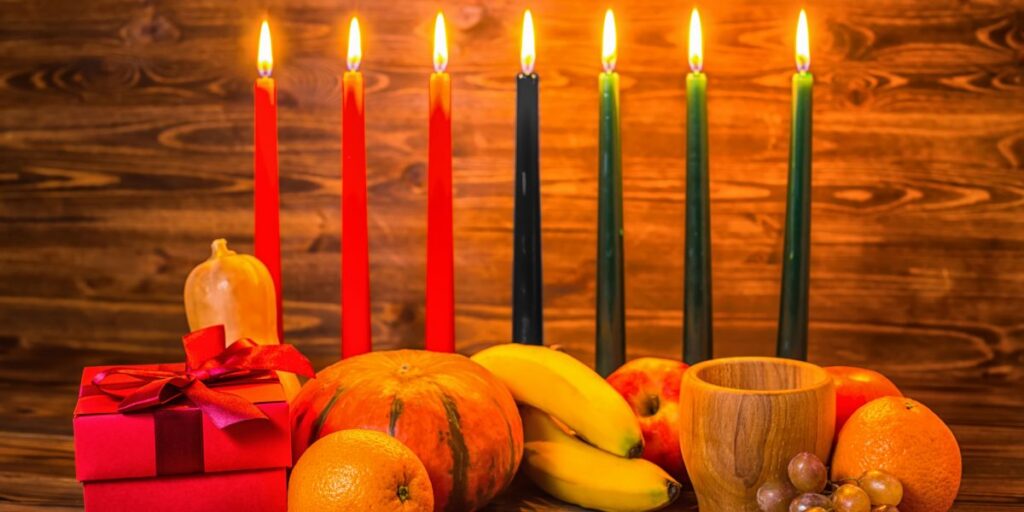
During mealtimes, families and friends get together. Everyone takes turns passing the unity cup and expressing something encouraging about the African-American community. Following that, the kinara’s candles are lighted, and the precepts of the religion are chanted. Everyone participates in the singing and dancing as the family comes together to celebrate their ancestry.
1st December World AIDS Day
In August 1987, James W. Bunn and Thomas Netter came up with the concept for World AIDS Day. At the time, Bunn and Netter were public information officials with the World Health Organization’s Global AIDS Program. The inaugural World AIDS Day was observed the following year on December 1, which has been the holiday’s official date ever since.
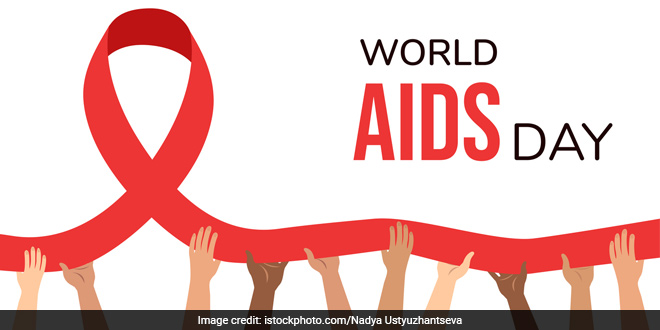
The goal of World AIDS Day is to raise awareness about HIV/AIDS and to remember people who have been afflicted or impacted by the illness.
One option to commemorate the day is to pay a visit to an orphanage, donate to a program that promotes HIV prevention, or lobby governments to step up their efforts to curb the spread of the virus.
26th December Boxing Day

When it comes to the origins of Boxing Day and the best way to commemorate it, there has always been a division of opinion. It is believed by some that this was the formal day on which churches distributed charity boxes to the impoverished after the Christmas season. Others use Boxing Day as a time to give gifts to errand boys, postmen, and other types of servants as a way of showing gratitude for the work they have done during the year.
Regardless of its symbolic significance, Boxing Day continues to be one of the most well-known holidays in December. Since then, the day has been observed as a public holiday in several nations throughout the globe, including Canada, the United Kingdom, Australia, and New Zealand, among others. Sports activities are traditionally held on Boxing Day in several nations to commemorate the holiday.
31st December New Year’s Eve
On top of that, the final December holiday on this list happens to occur on December 31st, which is the last day of the month. The objective of New Year’s Eve is to both commemorate the end of the previous year and herald at the beginning of the next year.

There are a variety of ways to commemorate this day. The majority of religious people go to their places of worship to express their gratitude to God for the blessings of another year. Pubs, restaurants, and other social events are where many people spend their New Year’s Eve celebrations. The festivities generally reach their zenith around midnight, when joyous yells, joyful melodies, and spectacular fireworks fill the air.
Important Days Chart of December 2022
| 1 December : | World AIDS Day |
| 2 December : | National Pollution Control Day Global Day for the Abolition of Slavery |
| 3 December : | World Day of the Impaired |
| 4 December : | Indian Navy Day |
| 5 December : | Global Volunteer Day World Land Day |
| 6 December : | St. Nicholas Day |
| 7 December : | Armed Causes Hole Day Global Civil Aviation Day |
| 8 December : | National Brownie Day |
| 9 December : | Global Anti-Corruption Day |
| 10 December : | Individual Rights Day |
| 11 December : | Global Hill Day |
| 12 December : | National Amrit Day |
| 13 December : | National Cocoa Day National Cello Day |
| 14 December : | National Power Conservation Day National Alabama Day Horse Day |
| 15 December : | Global Tea Day National Cupcake Day |
| 16 December : | Victory Day |
| 17 December : | Wright Brothers Day |
| 18 December : | Group Rights Day in India National Double Day National Ugly Xmas Jacket Day |
| 19 December : | Goa Liberation Day |
| 20 December : | Global Day of Individual Solidarity National Sangria Day |
| 21 December : | December 21:National Men’s Day |
| 22 December : | National Arithmetic Day National Day Nut Bread Day |
| 23 December : | Farmer’s Day |
| 24 December : | National Customer Rights Day National Egg Day Xmas Eve |
| December 25: | Xmas Day Good Governance Day (India) |
| 26 December : | Boxing Day (Canada) |
| 27 December : | National Fruitcake Day |
| 28 December : | National Small Movie Day |
| 29 December : | National Hero Day |
| December 30: | Bread Day |
| December 31: | New Year’s Eve |
Q1. Which month is known as World of Holidays?
Ans. December month is known as World of Holidays.
Q2. Name of all December Global Holidays?
Ans. Christmas, Hanukkah, Kwanzaa, New Year, Winter Solstice is the big festival in December global holidays.
Disclaimer: For more interesting articles visit Business Times.

